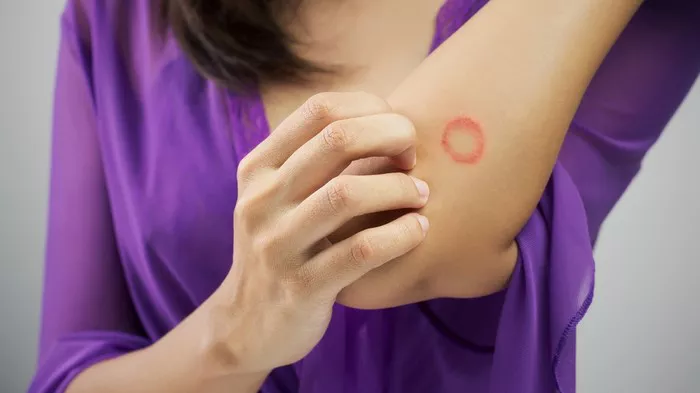Ringworm is a common fungal infection that affects the skin, nails, and hair. Despite its name, ringworm has nothing to do with worms. It is caused by a fungus called dermatophytes, which thrive on the skin, hair, and nails. Ringworm is known for its distinctive red, circular rash with raised, scaly edges. Many people who experience it wonder, “Does ringworm ever go away?” In this article, we will explore how ringworm develops, how long it lasts, treatment options, and the chances of it coming back.
What Causes Ringworm?
Ringworm is caused by a group of fungi known as dermatophytes. These fungi survive by feeding on the keratin found in the outer layer of your skin, hair, and nails. The infection is highly contagious and can spread through direct skin-to-skin contact, shared personal items like towels or razors, and contact with contaminated surfaces.
You can also catch ringworm from animals, especially pets like cats and dogs. It’s important to keep an eye on pets, as they can carry the fungus without showing symptoms. If you touch an infected animal or its belongings, you could become infected too.
The fungi thrive in warm, moist environments, making areas like locker rooms, swimming pools, and damp clothes prime spots for infection. People with weakened immune systems, excessive sweating, or poor hygiene are at a higher risk.
How Do You Know If You Have Ringworm?
Ringworm typically starts as a red, itchy spot on the skin. It usually forms a circular or oval-shaped rash, often with a raised, scaly border. The center of the rash may clear up as the fungus spreads outwards. Some people may experience blisters, oozing, or intense itching.
Ringworm can appear anywhere on the body, but it is most common on the feet (athlete’s foot), scalp (tinea capitis), groin (jock itch), and nails. It can also occur on the body (tinea corporis) or face (tinea faciei).
If you notice any unusual skin changes, it’s important to consult a healthcare provider. A dermatologist can confirm the diagnosis through a physical exam and, if necessary, a skin scraping or culture to identify the specific fungus causing the infection.
How Long Does Ringworm Last?
The duration of ringworm depends on several factors, including the area of the body affected, how quickly you start treatment, and the type of treatment used.
In general, ringworm can last anywhere from a few weeks to a couple of months. With proper treatment, most cases of ringworm will improve within 2 to 4 weeks. If the infection is not treated, it may persist longer and spread to other areas of the body.
For people with a weakened immune system or those who don’t follow treatment instructions, the infection may take longer to go away or may return after initial improvement.
Does Ringworm Ever Go Away on Its Own?
While it is possible for ringworm to go away on its own, it is unlikely. Most cases of ringworm require some form of treatment to fully clear up. The fungus needs to be killed with antifungal medications, which can be topical (applied to the skin) or oral (taken by mouth), depending on the severity of the infection.
Without treatment, the infection can linger for months or even years. Additionally, untreated ringworm is highly contagious and can spread to others or cause secondary infections.
Even if you don’t see the rash anymore, the fungus may still be present and can recur. It is always best to seek treatment as soon as you notice symptoms to prevent the infection from getting worse or spreading.
How Is Ringworm Treated?
There are two main types of treatment for ringworm: topical and oral medications.
Topical Treatments
The first-line treatment for most cases of ringworm is topical antifungal creams, ointments, or powders. These medications are applied directly to the affected area. Some common over-the-counter antifungals include clotrimazole, miconazole, and terbinafine.
Topical treatments typically work well for mild cases and smaller infections. However, they can take several weeks to fully clear up the infection. It’s important to follow the instructions carefully and continue using the treatment for the recommended duration, even if the rash begins to fade. Stopping treatment too early can lead to a recurrence of the infection.
Oral Treatments
For more severe or widespread cases of ringworm, or when topical treatments do not work, a doctor may prescribe oral antifungal medications. These medications include terbinafine, itraconazole, and griseofulvin.
Oral treatments are usually taken for several weeks to ensure the infection is fully eradicated. They may also be prescribed for people with compromised immune systems, as they may have a harder time fighting off fungal infections.
Home Remedies
In addition to medical treatments, some home remedies may help soothe the symptoms of ringworm. While these remedies may not cure the infection, they can offer relief. Common options include:
Tea tree oil: Known for its antifungal properties, tea tree oil can be applied to the affected area.
Apple cider vinegar: Some people use diluted apple cider vinegar to help kill the fungus.
Aloe vera: Aloe vera has soothing and healing properties that can reduce itching and inflammation.
Always speak to a healthcare provider before trying any home remedies to ensure they won’t interfere with your treatment plan.
How Can You Prevent Ringworm from Spreading?
Ringworm is highly contagious, but there are steps you can take to prevent it from spreading to others or recurring:
Keep the affected area clean and dry. Fungi thrive in moist environments, so it’s important to keep your skin dry.
Avoid sharing personal items. Do not share towels, razors, or clothing with others while you have ringworm.
Wash your hands frequently. If you touch the infected area, wash your hands immediately.
Treat pets. If you suspect your pet may have ringworm, take them to the vet for diagnosis and treatment.
Wear loose-fitting clothing. Tight clothes can trap moisture and encourage the growth of fungi.
Avoid public places. Avoid swimming pools, gyms, or locker rooms until the infection has cleared up.
Does Ringworm Come Back?
In some cases, ringworm may return after treatment. The chances of recurrence depend on several factors, including the type of ringworm, the strength of your immune system, and how thoroughly the infection was treated.
Some people may be more prone to developing ringworm again, especially if they are frequently exposed to fungi or have ongoing risk factors like sweating excessively or poor hygiene.
To prevent ringworm from coming back, it is essential to follow your healthcare provider’s treatment plan and take steps to avoid re-infection.
Conclusion: Does Ringworm Ever Go Away?
Ringworm is a treatable condition, but it doesn’t always go away on its own. It is caused by a fungal infection that requires antifungal treatment to fully clear up. Most cases of ringworm go away with proper treatment within a few weeks, but the infection can return if not treated properly or if proper precautions are not taken.
If you notice signs of ringworm, it’s important to seek medical advice early. With proper treatment and care, ringworm will go away, and you can prevent it from spreading to others. Remember to keep the affected area clean and dry, avoid sharing personal items, and follow the treatment plan prescribed by your healthcare provider to ensure a full recovery.
Related topics


























